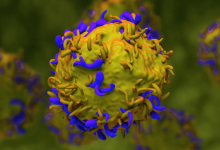Is Rheumatoid Arthritis Preventable? Save

Many conventional synthetic, biological, biosimilar, and targeted synthetic disease-modifying anti-rheumatic drugs are currently commercially available for the effective treatment of rheumatoid arthritis. However, the "Holy Grail" remains the prevention of its development.
During a clinical symposium at EULAR 2024 in Vienna, updates were presented on four prospective intervention trials conducted in patients experiencing joint pain without visible joint swelling. TREAT-EARLIER and ARIAA enrolled individuals with joint pain and subclinical joint inflammation detected by MRI scans of the hand (and additionally the forefoot in ARIAA). APIPPRA included patients with inflammatory joint pain and high-titer anti-citrullinated peptide antibodies (ACPA), or both rheumatoid factor and ACPA. STOP-RA enrolled individuals with high-titer ACPA (anti-CCP3 antibodies ≥2 times upper limit of normal), regardless of the presence of joint symptoms.
Annette van der Helm-van Mil discussed TREAT-EARLIER (POS0061), in which participants received either a single intramuscular injection of DepoMedrol 120 mg plus methotrexate up to 25 mg/week for one year, or placebo, followed by observation for the development of clinically evident rheumatoid arthritis over the subsequent year.[1, 2] Interestingly, there was no significant difference in rheumatoid arthritis development between those treated with methotrexate and those given placebo. However, among ACPA-negative individuals with joint pain and subclinical inflammation in at least two joints or tenosynovitis of the metacarpophalangeal joint extensor tendons on MRI, the combination of DepoMedrol and one year of methotrexate increased the time without development of rheumatoid arthritis over the subsequent three years. This study suggests that one year of methotrexate might reduce the risk of developing clinically evident rheumatoid arthritis in ACPA-negative individuals.
Jürgen Rech presented findings from ARIAA, in which participants received either abatacept or placebo for six months, followed by one year of observation off treatment for improvement in MRI-detected inflammation in the wrist and metacarpophalangeal joints.[3] During abatacept treatment, no subject developed clinically evident rheumatoid arthritis. However, abatacept only delayed rather than prevented the onset of clinically apparent rheumatoid arthritis in this population.
Andrew Cope discussed APIPPRA, in which participants received abatacept or placebo for one year, followed by another year off treatment to observe the development of clinically evident rheumatoid arthritis.[4] During abatacept treatment, patient-reported outcomes improved significantly, and arthritis-free survival was better compared with placebo. However, after discontinuation of treatment, almost as many individuals who received abatacept developed clinically evident arthritis as those who received placebo. Post hoc analyses indicated that individuals with multiple autoantibodies and those with tender metacarpophalangeal joints at baseline were more likely to experience a sustained effect of abatacept in preventing the development of rheumatoid arthritis. This highlights the potential role of baseline autoantibody signatures in defining both the risk of developing rheumatoid arthritis and responsiveness to abatacept as a preventive strategy.
Kevin Deane presented the results of STOP-RA, a prospective study in which individuals with high-titer ACPA received hydroxychloroquine or placebo for one year, followed by observation for two years for the development of clinically evident rheumatoid arthritis.[5] The study was halted prematurely due to futility, as approximately one-third of individuals in both groups developed clinically evident rheumatoid arthritis after 36 months of follow-up. Factors at baseline associated with higher risk of developing rheumatoid arthritis included higher CDAI scores, increased fatigue levels, and the presence of rheumatoid factor in addition to ACPA. Thus, hydroxychloroquine failed to demonstrate superiority over placebo in preventing or delaying the onset of clinically evident rheumatoid arthritis in individuals with high-titer ACPA and no evidence of inflammatory arthritis at baseline.
Collectively, these studies suggest that certain subgroups of patients with subclinical joint inflammation may benefit from a finite course of treatment with medications such as methotrexate or abatacept to prevent the development of clinically evident rheumatoid arthritis. Future studies should further explore the potential of methotrexate in ACPA-negative individuals with joint pain and subclinical inflammation on MRI, as well as that of abatacept in individuals with high-titer ACPA and multiple other autoantibodies, particularly those with tender metacarpophalangeal joints. Although hydroxychloroquine was ineffective in this context, similar strategies targeting the process of citrullination such as AZD1163, the bispecific antibody to PAD2 and PAD4 (OP0110), warrant investigation for their potential to prevent rheumatoid arthritis.[6]
REFERENCES
1. Dumoulin QA, Krijbolder DI, Visser K, Lard LR, Van der Helm-van Mil AHM. Interception of the development of rheumatoid arthritis by a 1-year course of methotrexate in ACPA-negative arthralgia patients at increased risk for rheumatoid arthritis: 4 year results of the TREAT EARLIER trial [abstract]. Ann Rheum Dis. 2024; 83:454.
2. Krijbolder DI, Verstappen M, van Dijk BT, Dakkak YJ, Burgers LE, Boer AC, et al. Intervention with methotrexate in patients with arthralgia at risk of rheumatoid arthritis to reduce the development of persistent arthritis and its disease burden (TREAT EARLIER): a randomised, double-blind, placebo-controlled, proof-of-concept trial. Lancet. 2022 Jul 23; 400(10348):283-294.
3. Rech J, Tascilar K, Hagen M, Kleyer A, Manger B, Schoenau V, et al. Abatacept inhibits inflammation and onset of rheumatoid arthritis in individuals at high risk (ARIAA): a randomised, international, multicentre, double-blind, placebo-controlled trial. Lancet. 2024 Mar 2; 403(10429):850-859.
4. Cope AP, Jasenecova M, Vasconcelos JC, Filer A, Raza K, Qureshi S, et al. Abatacept in individuals at high risk of rheumatoid arthritis (APIPPRA): a randomised, double-blind, multicentre, parallel, placebo-controlled, phase 2b clinical trial. Lancet. 2024 Mar 2; 403(10429):838-849.
5. Deane K, Striebich C, Feser M, Demoruelle K, Moss L, Bemis E, et al. Hydroxychloroquine does not prevent the future development of rheumatoid arthritis in a population with baseline high levels of antibodies to citrullinated protein antigens and absence of inflammatory arthritis: Interim analysis of the StopRA trial [abstract]. Arthritis Rheumatol. 2022; 74.
6. Sims DA, Andrews J, Kuriakose T, Scaletta L, Rajasinghe L, Sigurdardottir A, et al. AZD1163 - First-in-class anti-PAD2/4 bi-specific antibody to inhibit autoantigen formation in rheumatoid arthritis [abstract]. Ann Rheum Dis. 2024; 83:54.










If you are a health practitioner, you may Login/Register to comment.
Due to the nature of these comment forums, only health practitioners are allowed to comment at this time.